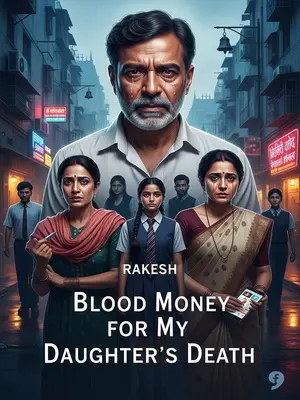Chapter 2: A Fatal Decision
Just then, the boss, Mr. Mehra, stormed over.
The fragrance of his imported perfume hit me before he did. His face was set in a familiar scowl, lips pursed as if he’d just bitten into a green chilli.
He came to my desk and asked, all serious, “Is the compensation money ready?”
His voice was oily, rehearsed, like those politicians on Republic TV who never answer the real question. I looked up, pretending to shuffle some files, though my hand was already sweaty on the mouse.
I knew what he meant. Our company’s old machines were falling apart, and the workers were scared to use them.
Every morning, the clang of metal and the smell of hot oil reminded me of my father’s tales from the factory floor. But these machines—no one would trust them, not even the rats hiding in the storeroom.
There was a worker whose mother was gravely ill. To pay her hospital bills, he forced himself to work.
I remembered him—Gopal, always smiling, always polite, his hands rough from years of manual labour. The kind who brought sweets on festivals, even if he couldn’t afford them.
The machine malfunctioned, and he died on the spot.
I’d seen the blood-stained rag in the bin, the hush that fell over the floor, the trembling hands of the other workers as they finished his shift because, well, kaam to karna hi hai.
I told the boss the two crore rupees compensation was ready.
Even saying it felt strange. Two crore—a fortune for a family who barely made ends meet. I remembered his mother’s frail body draped in a cheap cotton saree, hope flickering in her tired eyes.
He said, “Don’t pay it. Transfer it to Client Sharma first.”
His words landed like a slap. I looked up, unable to believe what I was hearing. Sharma sir—always demanding, always late with his own payments. Typical.
I was shocked. “If you send it to the client, what about the worker’s mother? The hospital’s waiting for the money to save her life!”
My voice cracked, but I didn’t care. For once, I wanted to shout, to let everyone know what was happening behind these glass doors.
The boss sneered, “Are you stupid? I checked his family background. He and his mother are both only children, and she won’t last long. If we drag it out, once she’s dead, do you think we still need to pay?”
His words chilled me. It was the kind of calculation you’d expect from a villain in a Saif Ali Khan thriller, not a man who prays at the Ganesh mandal every Tuesday.
I stared at the boss in disbelief.
For a second, all the noise of the office faded—the ringing phones, the clicking keyboards, even the distant laughter from the marketing team. All I could see was his dead, greedy eyes.
But he thought I was impressed by his cunning, tapped his head and said, “Running a business takes brains. Just stall her, she won’t last long.”
He even flashed a half-smile, like he was expecting me to applaud. It made my skin crawl.
In that moment, I hesitated no longer.
The scales fell from my eyes. The decision was made, clean and sharp as a barber’s blade.
This beast deserves to be damned for eternity.
I silently prayed to any god who was listening: Let him taste the dust, just once. Let him know what it feels like to be powerless.
It was almost time to leave work, but the boss suddenly told everyone not to leave after clocking out—there’d be a meeting, but remember to clock out first.
The announcement was made in that loud, nasal voice, echoing down the corridor. Everyone groaned inwardly—another free hour for the company, another missed bus, another scolding from home for coming late. Someone muttered, “Woh hi toh kaam hai inka, paisa bachana.”
That was his usual trick: make us clock out, then hold meetings so he didn’t have to pay overtime.
He was an expert at squeezing every last paisa from us. You could set your watch by his miserly habits. Once, he’d even banned tea breaks, saying, “Arrey, chai pee ke bhi paisa milta hai kya?”
Everyone shuffled to the meeting room, heads down. I deliberately lingered at my desk, organising papers. When the boss went into his office, I replied to the scam message.
I could feel the curious eyes of my colleagues as I took my time, arranging files, pretending to check emails. The office cleaner, Ramesh, gave me a knowing nod—he’d seen it all before.
I typed: “Is this Mr. Sharma?”
The words looked innocent enough. My pulse thrummed in my ears. For a moment, the world shrank to the blinking cursor on my screen.
Mr. Sharma is our company’s biggest client, holding our lifeblood in his hands.
If he sneezed, the company caught a cold. Everyone walked on eggshells around him, the boss especially. I’d even seen him sending Diwali hampers to Sharma’s house.
The scammer replied quickly: “Yes, I changed my account number.”
The response came within seconds, the sort of efficiency you’d never expect from our real client. That told me everything I needed to know.
I sneered. “Okay, I’ll transfer the money right away.”
I felt a twisted satisfaction, picturing the boss’s reaction when he found out. My thumb hovered over the send button, my mouth set in a grim line.
Now was the time to act—during meetings, the boss forbade anyone from looking at their phones.
He was strict about it, even threatening to confiscate phones if he caught anyone texting. The perfect cover for what I was about to do.
As the accountant, if I transferred money to a client without the boss’s signature, was it illegal?
I already knew the answer, but I ran the question through my mind once more, just to be sure. This was the point of no return.
No doubt. It was.
But I’d studied similar cases. An accountant once transferred 2.76 crore rupees to a scammer, and the company demanded repayment. The court ruled the employee didn’t benefit, repayment was beyond their means, and the employer should bear the risk. The employee only had to pay back 40,000 rupees.
I remembered reading that legal article, even saving the PDF on my phone for courage. Laws in India were twisted, but sometimes, they offered a little mercy to the desperate.
That company lost 2.72 crore.
I thought of the news headlines, the way the city gossips over samosas and chai at the tapri outside the office gate. Soon, it would be Mehra’s face on those WhatsApp forwards.
And me?
First, I sent the two crore rupees that was meant for the dead worker’s compensation. Then I transferred all the company’s liquid assets—14 crore rupees—into the scammer’s account.
The numbers on the screen didn’t feel real. Fourteen crore—more money than my entire mohalla had seen in a lifetime. My hands moved with calm precision, almost as if someone else was doing it for me. I double-checked the account numbers, pressed ‘send,’ and watched as the confirmation emails landed, one after another.
I knew exactly what I was doing. The company was bankrupt, right then and there.
I imagined the boss’s eyes, bulging in disbelief, his hand clutching his chest like an actor in an old Bollywood film. The moment tasted sweeter than any festival sweet.
The boss’s Audi, his wife’s Sabyasachi sarees, their kid’s private school tuition—after tonight, all of it would be gone.
I almost chuckled, picturing Mrs. Mehra bargaining in the local market, her designer bangles hidden under a shawl. No more Instagram stories of vacations in Dubai or Mauritius.
Especially since half of that 14 crore was private loans. The boss’s fate was sealed: utter ruin.
The local moneylenders weren’t forgiving types. By the time the sun rose, Mehra’s name would be mud from Andheri to Karol Bagh.
I walked into the meeting room. Everyone was already seated.
The air was heavy, everyone’s faces drawn tight. Someone was fanning themselves with the attendance register. The only sound was the buzzing of the old tube light overhead.
As soon as the meeting started, the boss swept his cold gaze across us. “You all look so lifeless—seems I’ve been too soft on you.”
He made it sound like a joke, but his eyes were hard. It was the kind of thing bosses say when they want to scare you but are too lazy to think of something original.
I sighed. Why do so many bosses love to spout this kind of nonsense?
It was like a ritual. Some people do aarti, others do motivational speeches. Our boss did both—one for God, one for himself.
The boss worked us for free, stole our wages—what was so good about him?
I glanced around. The old accounts uncle was picking at his nails, the HR lady was blinking rapidly, hiding her yawn. No one even bothered pretending anymore.
I noticed the boss’s wife, Mrs. Mehra, and their little princess Priya were present. Instantly, I knew this meeting was going to be something else.
Mrs. Mehra adjusted her pallu, nose wrinkling as if the very idea of worker compensation was a bad smell. Priya, with her branded backpack and sullen pout, looked bored, scrolling through her phone until her mother gave her a sharp look.
If the boss is an old beast, then his daughter is a little beast.
It’s always the same in rich families—arrogance is inherited, not earned. Priya’s antics were legendary in the office WhatsApp group, though no one dared to mention her by name.
The office WhatsApp group buzzed with a forwarded screenshot—Priya’s handiwork, but no one dared type her name.
She goes to a fancy private school, and those schools waive tuition for toppers to boost their stats. There was a poor girl in her class, top grades, there on a scholarship. Out of pure jealousy, the little princess slapped her in the bathroom, stripped her, took photos, and posted them online.
It was the talk of the entire colony, the kind of thing aunties whisper about at kitty parties. But Priya’s family bought their way out of trouble, same as always.
Such vile bullying was easily settled with money by her family. The school just gave her a slap on the wrist—an internal punishment, no real consequences.
The victim’s family moved away, and life went on. In India, money is the best detergent—washes away all stains, especially on reputation.













